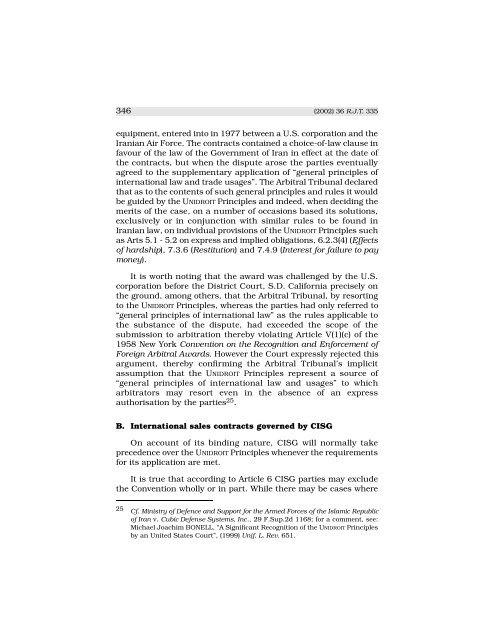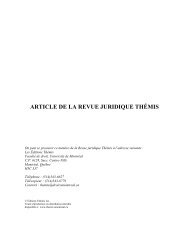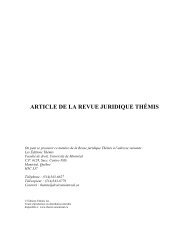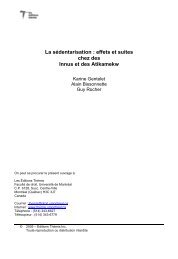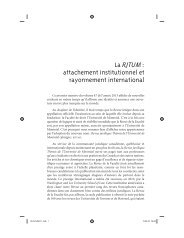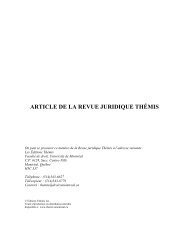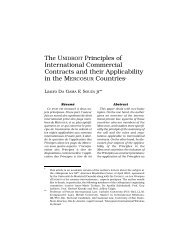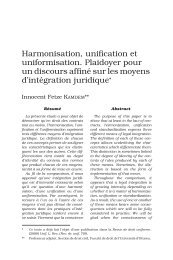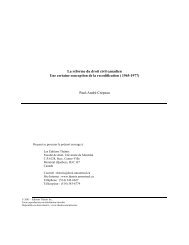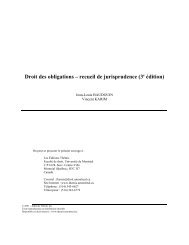The UNIDROIT Principles of International Commercial Contracts and ...
The UNIDROIT Principles of International Commercial Contracts and ...
The UNIDROIT Principles of International Commercial Contracts and ...
Create successful ePaper yourself
Turn your PDF publications into a flip-book with our unique Google optimized e-Paper software.
346 (2002) 36 R.J.T. 335<br />
equipment, entered into in 1977 between a U.S. corporation <strong>and</strong> the<br />
Iranian Air Force. <strong>The</strong> contracts contained a choice-<strong>of</strong>-law clause in<br />
favour <strong>of</strong> the law <strong>of</strong> the Government <strong>of</strong> Iran in effect at the date <strong>of</strong><br />
the contracts, but when the dispute arose the parties eventually<br />
a g reed to the supplementary application <strong>of</strong> “general principles <strong>of</strong><br />
i n t e rnational law <strong>and</strong> trade usages”. <strong>The</strong> Arbitral Tribunal declare d<br />
that as to the contents <strong>of</strong> such general principles <strong>and</strong> rules it would<br />
be guided by the <strong>UNIDROIT</strong> <strong>Principles</strong> <strong>and</strong> indeed, when deciding the<br />
merits <strong>of</strong> the case, on a number <strong>of</strong> occasions based its solutions,<br />
exclusively or in conjunction with similar rules to be found in<br />
Iranian law, on individual provisions <strong>of</strong> the UN I D R O I T <strong>Principles</strong> such<br />
as Arts 5.1 - 5.2 on express <strong>and</strong> implied obligations, 6.2.3(4) (E ff e c t s<br />
<strong>of</strong> hardship), 7.3.6 (Restitution) <strong>and</strong> 7.4.9 (Interest for failure to pay<br />
money).<br />
It is worth noting that the award was challenged by the U.S.<br />
corporation before the District Court, S.D. California precisely on<br />
the ground, among others, that the Arbitral Tribunal, by resorting<br />
to the <strong>UNIDROIT</strong> <strong>Principles</strong>, whereas the parties had only referred to<br />
“general principles <strong>of</strong> international law” as the rules applicable to<br />
the substance <strong>of</strong> the dispute, had exceeded the scope <strong>of</strong> the<br />
submission to arbitration thereby violating Article V(1)(c) <strong>of</strong> the<br />
1958 New York Convention on the Recognition <strong>and</strong> Enforcement <strong>of</strong><br />
Foreign Arbitral Awards. However the Court expressly rejected this<br />
a rgument, thereby confirming the Arbitral Tribunal’s implicit<br />
assumption that the UN I D R O I T <strong>Principles</strong> re p resent a source <strong>of</strong><br />
“general principles <strong>of</strong> international law <strong>and</strong> usages” to which<br />
arbitrators may resort even in the absence <strong>of</strong> an expre s s<br />
authorisation by the parties 25 .<br />
B. <strong>International</strong> sales contracts governed by CISG<br />
On account <strong>of</strong> its binding nature, CISG will normally take<br />
precedence over the <strong>UNIDROIT</strong> <strong>Principles</strong> whenever the requirements<br />
for its application are met.<br />
It is true that according to Article 6 CISG parties may exclude<br />
the Convention wholly or in part. While there may be cases where<br />
25 Cf. Ministry <strong>of</strong> Defence <strong>and</strong> Support for the Armed Forces <strong>of</strong> the Islamic Republic<br />
<strong>of</strong> Iran v. Cubic Defense Systems, Inc., 29 F.Sup.2d 1168; for a comment, see:<br />
Michael Joachim BONELL, “A Significant Recognition <strong>of</strong> the <strong>UNIDROIT</strong> <strong>Principles</strong><br />
by an United States Court”, (1999) Unif. L. Rev. 651.


